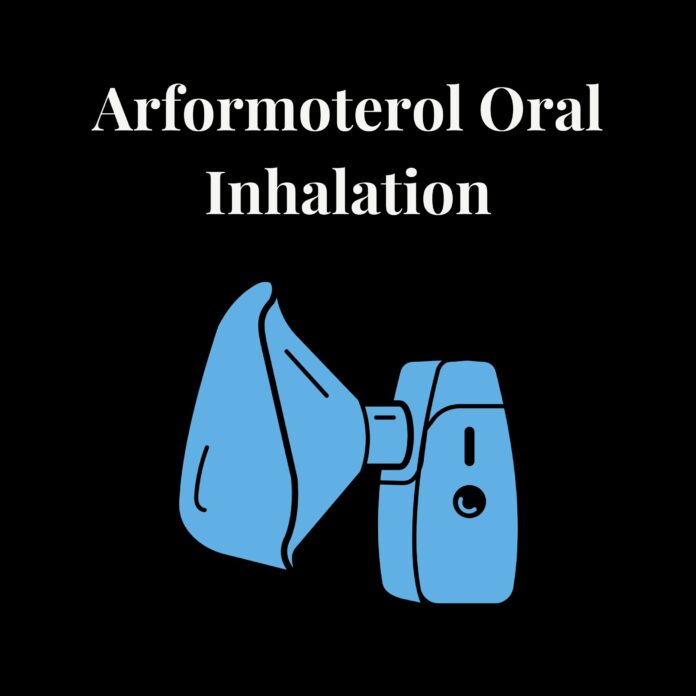Uses of Arformoterol Oral Inhalation
Arformoterol oral inhalation is used to control wheezing, shortness of breath, coughing, and chest tightness caused by chronic obstructive pulmonary disease (COPD; a group of lung diseases, which includes chronic bronchitis and emphysema). Arformoterol is in a class of medications called long-acting beta-agonists (LABAs). It works by relaxing and opening air passages in the lungs, making it easier to breathe.
Side Effects of Arformoterol Oral Inhalation
Arformoterol oral inhalation may cause side effects. Tell your doctor if any of these symptoms are severe or do not go away:
- nervousness
- uncontrollable shaking of a part of the body
- headache
- dizziness
- tiredness
- lack of energy
- not feeling well
- flu symptoms
- swelling of arms or legs
- difficulty falling asleep or staying asleep
- pain, especially back pain
- diarrhea
- nausea
- vomiting
- cramps
- dry mouth
Some side effects of arformoterol oral inhalation can be serious. If you experience any of these symptoms, call your doctor immediately:
- fast or pounding heartbeat
- chest pain
- hives
- rash
- swelling of the eyes, face, tongue, lips, mouth, hands, feet, ankles, or lower legs
- increased difficulty breathing or swallowing
Arformoterol may cause other side effects. Call your doctor if you have any unusual problems while using this medication.
Warnings & Precautions
Before using arformoterol oral inhalation:
- tell your doctor and pharmacist if you are allergic to arformoterol, formoterol (Perforomist, in Bevespi, Dulera, Symbicort), any other medications, or any of the ingredients in arformoterol solution. Ask your pharmacist for a list of the ingredients.
- tell your doctor if you use another LABA such as formoterol (Perforomist, in Bevespi Aerosphere, Duaklir Pressair, Dulera, Symbicort), indacaterol (Arcapta), olodaterol (Striverdi Respimat, in Stiolto Respimat), salmeterol (Serevent, in Advair), or vilanterol (in Anoro Ellipta, Breo Ellipta, Trelegy Ellipta). These medications should not be used with arformoterol. Your doctor will tell you which medication you should use and which medication you should stop using.
- tell your doctor and pharmacist what prescription and nonprescription medications, vitamins, nutritional supplements, and herbal products you are taking or plan to take with arformoterol oral inhalation. Be sure to mention any of the following: aminophylline; amiodarone (Nexterone, Pacerone); antidepressants such as amitriptyline, amoxapine, clomipramine (Anafranil), desipramine (Norpramin), doxepin (Silenor, Zonalon), imipramine (Tofranil), nortriptyline (Pamelor), protriptyline (Vivactil), and trimipramine (Surmontil); beta blockers such as atenolol (Tenormin), labetalol (Normodyne), metoprolol (Lopressor, Toprol XL, others), nadolol (Corgard), propranolol (Inderal), and sotalol (Betapace, Sorine, Sotylize, Betapace AF); diet pills; disopyramide (Norpace); diuretics (‘water pills’); dofetilide (Tikosyn); epinephrine (Primatene Mist);erythromycin (E.E.S., E-Mycin, Erythrocin); medications for colds such as phenylephrine (Sudafed PE), and pseudophedrine (Sudafed); monoamine oxidase (MAO) inhibitors, including isocarboxazid (Marplan), linezolid (Zyvox), phenelzine (Nardil), rasagiline (Azilect), selegiline (Emsam, Zelapar), and tranylcypromine (Parnate); moxifloxacin (Avelox);steroids such as dexamethasone, methylprednisolone (Depo-Medrol, Medrol, Solu-Medrol), and prednisone (Rayos); pimozide (Orap); procainamide; quinidine (in Nuedexta); theophylline (Theochron, Theo-24); and thioridazine. Your doctor may need to change the doses of your medications or monitor you carefully for side effects. Many other medications may also interact with arformoterol oral inhalation, so be sure to tell your doctor about all the medications you are taking, even those that do not appear on this list.
- tell your doctor if you have asthma. Your doctor will tell you not to use arformoterol oral inhalation unless you are using it along with an inhaled steroid medication.
- tell your doctor if you have or have ever had an irregular heartbeat; QT prolongation (an irregular heart rhythm that can lead to fainting, loss of consciousness, seizures, or sudden death); high blood pressure; seizures; diabetes; or heart, liver, or thyroid disease.
- tell your doctor if you are pregnant, plan to become pregnant, or are breast-feeding. If you become pregnant while using arformoterol oral inhalation, call your doctor.
- you should know that arformoterol oral inhalation sometimes causes wheezing and difficulty breathing immediately after it is inhaled. If this happens, call your doctor right away. Do not use arformoterol oral inhalation again unless your doctor tells you that you should.
Other
Keep all appointments with your doctor.
Before having any laboratory test (especially those that involve methylene blue), tell your doctor and the laboratory personnel that you are using arformoterol oral inhalation.
Do not let anyone else use your medication. Ask your pharmacist any questions you have about refilling your prescription.
It is important for you to keep a written list of all of the prescription and nonprescription (over-the-counter) medicines you are taking, as well as any products such as vitamins, minerals, or other dietary supplements. You should bring this list with you each time you visit a doctor or if you are admitted to a hospital. It is also important information to carry with you in case of emergencies.
Source
All information has been provided courtesy of MedLinePlus from the National Library of Medicine and from the FDA.



